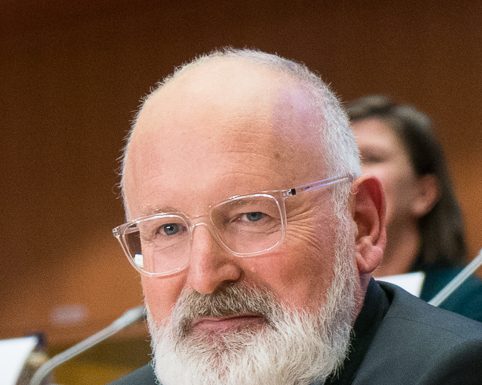According to The Times, UK Home Secretary Priti Patel (picture) will introduce legislation next week to enable the UK government to send asylum seekers abroad for processing. It’s the first time ever the UK will attempt to create an offshore immigration processing centre for asylum seekers.
British PM Boris Johnson is reportedly keen on the plan, after more than 5,600 migrants crossed the Channel this year, making a dangerous journey in small boats. Earlier UK government ideas included sending asylum seekers to Ascension Island, in the southern Atlantic Ocean, to be processed, and turning disused ferries out at sea into processing centres.
UK Home Secretary Priti Patel will introduce laws next week to enable the government to send asylum seekers abroad for processing as she opens talks with Denmark over sharing a centre in Africa https://t.co/ghyDw37d3J
— Pieter Cleppe (@pietercleppe) June 28, 2021
At the same time, the UK is opening talks with Denmark over sharing a centre in Africa, which Denmark is eying in Rwanda, as highlighted by Swedish MEP Charlie Weimers on Brussels Report, earlier this month:
"The EU should consider to adopt the Danish approach to immigration"
New article, by Swedish MEP @weimers: https://t.co/crHxIToQtx #immigration #denmark #sweden @YlvaJohansson @statsmin— BrusselsReport.EU (@brussels_report) June 15, 2021
The European Commission has rejected the Danish model, calling it a “wrong signal”. Nevertheless, the European Parliament and the Council have just agreed to transform the “European Asylum Support Office” into a “European Union Agency of Asylum”. This new agency will have a reinforced mandate that will also contribute to:
“Capacity building in non-EU countries to improve asylum and reception systems and support EU and Member State resettlement schemes, building on the existing cooperation with UN agencies.”
Agreement on new EU law turning EU asylum support office into EU asylum agency – https://t.co/cOsPB0JIgE
nb this has been separated from other EU asylum law proposals, where negotiations are still difficult— Steve Peers (@StevePeers) June 29, 2021
As highlighted on Brussels Report, the Danish model closely resembles Australia’s model, which has managed to reduce the numbers of migrant drownings to close to zero:
"Australia’s approach has managed to reconcile firm border protection with maintaining the right to asylum, by bringing everyone trying to sneak in illegally to places outside of its territory, thereby avoiding many drownings at sea"
— BrusselsReport.EU (@brussels_report) May 11, 2021
Former Brexit campaigner and British MEP Nigel Farage, who has been taking a close look at the UK’s border crisis, is not convinced of the Australian approach, as he prefers to push back migrants:
"There is no legal way we will be able to deport people to Rwanda or any where else."
Nigel Farage criticises Home Secretary Priti Patel's plans to process asylum seekers offshore.
Watch GB News on Freeview 236, Sky 515 and Virgin Media 626. pic.twitter.com/8DTL1xd6Dy
— GB News (@GBNEWS) June 28, 2021
This is not something the European Court of Human Rights condones, as Farage also admits the UK would need to leave the European Convention on Human Rights to enact “pushbacks”.
Even then, there may be other legal hurdles, and a big crisis between the UK and France may erupt, similar to tensions between Spain and Morocco last month, when almost 10.000 migrants crossed from Morocco into neighboring Ceuta, an eight-square-mile Spanish-owned city on Africa’s northern coast which is on European Union territory. This amounted to the largest single-day influx of unregulated migrants ever and was the result of Morocco “weaponising” migration, following a decision by Spain to allow the leader of the Western Saharan independence movement to receive medical treatment in Spain. The statement by Morocco’s ambassador to Madrid, Karima Benyaich, that “actions have consequences”, made clear that the migrant influx was a deliberate act of retaliation. Spanish-Moroccan diplomatic relations have improved since.
A few years ago, the idea of offshore asylum reception has also received support from the German liberal FDP, which may come to power in Germany after the September elections:
German FDP calls for EU-funded "temporary refugee cities & camps in northern Africa under UN supervision"https://t.co/TsbUprVhKc
— Pieter Cleppe (@pietercleppe) September 5, 2017
At their Summit in 2018, EU leaders agreed an approach that involves some kind of offshore asylum processing, as they decided to negotiate with non-EU countries like Tunesia or Egypt to convince them to bring people saved at sea over there, at “disembarkation centers”. This has failed so far.
As argued on Brussels Report, joint EU action would be more than useful here:
“What has not been tried yet is to link EU development aid spending and visa arrangements with EU demands when negotiating with Europe’s neighbourhood. EU demands should not only include hosting the “disembarkation centers” but also convincing countries to welcome back their own citizens when they are denied asylum in Europe.”
Perhaps a successful joint UK-Danish initiative can make the European Commission change its mind.
Ultimately, given how intense the pressure on Europe’s external borders may become, if a truly large scale venture would be needed, “refugee cities”, as a genuine way to help those in search of a better life, may become less realistic than often assumed:
My 2018 @CapX comment on #refugee cities: "It’s possible that European countries would manage to “stem the flow” by merely creating a centre outside Europe for migrants who stand no chance of gaining asylum." This will not suffice.https://t.co/v1GluWET9D#MoriaCamp pic.twitter.com/SQcJImPA1J
— Pieter Cleppe (@pietercleppe) September 14, 2020













